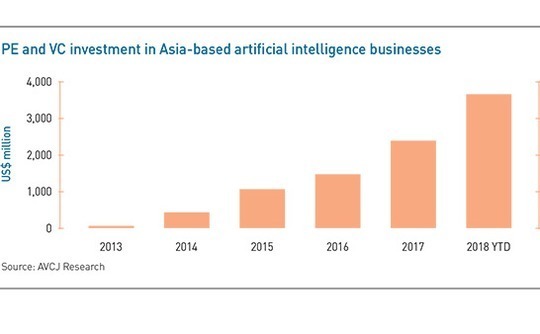
Back office technology: Clearing cobwebs
Technologies credited with completely transforming the financial sector have yet to make a dent on day-to-day operations in private equity. The status quo, however, will not last
Despite being eager to invest artificial intelligence (AI), big data, and blockchain, private equity firms have proven slow to adopt these technologies internally. The reasons for the hesitancy range from the cultural to the personal, but in the end, they will all be trumped by an implacable imperative to modernize.
Although only a smattering of fund managers currently use these technologies to increase efficiency in their operations, mounting investment in data-driven companies hints at the industry's long-range vision to upgrade back-end operations by onboarding knowhow. For example, PE investment in Asian AI companies has risen sharply from $61.3 million in 2013 to $3.6 billion so far this year, according to AVCJ Research. Blockchain has followed a similar curve, albeit with less scale.
This activity has overlapped a general expansion of the private equity universe. Growth in the number of funds and amount of capital raised has coincided with increased demand for transparency from LPs. At the same time, a rapid evolution in the practical realities of high-volume business process management has recast raw information in almost any form as a useful, and indeed indispensable, asset.
Investors with better access to large datasets are expected to represent some of the first success stories. As these early movers redefine best practices among LPs and GPs alike, the rest of the field will be obliged to play catch-up or risk falling by the wayside. Some firms will outsource processes, seeking to manage their costs while others reap data-driven efficiencies, but this ploy becomes less viable the more AI and blockchain-related systems are considered core intellectual property.
"There will be a point where some GPs that don't effectively use advanced technologies will start to fall out of business because they will have to substantially lower their fees in order to deliver competitive net results to their investors," says Paulo Salomao, a managing director at Accenture. "I'd argue we're only 3-5 years away from that starting to make a difference. It's not going to be an overnight phenomenon, but you're going to gradually see a shift in value allocation across the industry with a reduction in the number of GPs."
Even as GPs scramble to modernize, LPs with limited staffs and technical bandwidth are also under pressure to improve efficiency in fund selection as investment opportunities multiply to unmanageable levels. Cross-referencing macroeconomic data, with GP performance information and details such as key persons in individual funds are likely to feature prominently.
A lack of traction on this front to date is said to have resulted in LPs conservatively sticking with the same GPs vintage after vintage and therefore failing to sufficiently diversify their portfolios. It goes some way towards explaining a recent survey by Coller Capital which found that 67% of LPs expect AI tools to be used in private equity in the next five years. Much of this shift will be driven by increased administrative requirements around emerging reporting areas such as environmental, social, and governance (ESG) compliance.
"The number of data points LPs expect to get from a fund manager today is tenfold what they used to ask for less than five years ago, but the private equity industry is still very much underequipped when it comes to technology in a general sense, let alone AI, blockchain, and big data," says Tarek Chouman, CEO at eFront. "It's amazing to see firms today that are just using Excel or, in the best case, CRM [customer relationship management] software, even as the increasing burden of work requires new people, processes and systems."
Trust issues
So far, the slowness to upgrade back-end operations has not been attributed to cost. Running a simple AI program over an established database could entail an upfront expense of $500,000 to $1 million, but the system will be usable indefinitely. Costs can climb into a $5-10 million range, however, when more detailed analytics and multiple sources of data are needed.
To some extent, that expense can be offset by the emerging availability of out-of-the-box tools for data management. Typical products include platforms that allow processing of large datasets for sector analysis or background-check purposes, as well as data transformation and data visualization systems, financial transaction facilitation infrastructure, and dashboards to optimize GP-LP communications.
Private equity contends with a few stumbling blocks to realizing upgrades of this kind, including the fact that the industry works with imperfect datasets that are not often considered useful to conventional number crunching techniques. Perhaps more importantly, PE players are likely to balk at the idea of tech-enabled information sharing where it touches on proprietary details around deals. Meanwhile, building trust – the forte of decentralized record keeping technologies such as blockchain – continues to be seen as an in-person job.
"I have a firm belief that there will always be a certain degree of difficulty in data exchange because availability, exhaustiveness and granularity of information is sometimes not in the best interest of GPs even though it should be transparent to everyone invested in it," says Eric Marchand, an investment director with Unigestion. "However, the industry has come to a crossroads, where the amount of data requests that GPs receive keeps on increasing, so they are now cornered and much more willing to explore different types of digitization or automated information exchange."

Unigestion, which has some $25 billion under management in private markets, is tackling these issues with a blockchain-powered platform developed by IBM and Northern Trust. The tool aims to provide "one version of the truth" in the form of real-time fund data access and information transparency between all parties, including GPs, LPs, and regulators, with no central authority. It is touted as the first commercial blockchain deployment in PE and part of a broader overhaul by Unigestion that will include the establishment of a new kind of asset management matrix.
Blockchain, often in combination with AI, is set to disrupt other back-end practices as well. In addition to streamlining, standardizing and validating various areas of auditing and reporting work, the technology may facilitate more systematized investment structure management, drawdowns, fundraising, and legal processes. In the latter case, this could include lawyer-free drafting of LP agreements (LPA). The idea is to address complaints from some industry professionals that legal middlemen are baking controversy into LPAs as a means of extending expensive negotiations.
Coller Capital is taking an inclusive approach that focuses on leveraging its specialization in the secondary market, where a relatively large amount of publicly available data is expected to drive efficiencies from tax filing to ESG reporting. The firm plans to reduce manual inputs and better manage the complexities around formatting and interpreting data differently for each counterparty in the PE value chain. But as it turns out, this need for customization is both a motivator and an impediment to implementing new back-office technologies.
"The way that reporting works in private equity is very bespoke from one firm to another, which actually doesn't lend itself so well in terms of automation of the process compared to an industry like insurance where documents are very standardized," says Louise Boothby, a partner at Coller. "But AI is impacting all industries, including private equity, and if you're not looking at it, there's a risk that you could get left behind. Even if it's exploratory and we conclude that it doesn't have widespread applications, we feel that it's worth investing in."
Competitive pressure
The modularity requirements for the analytical equipment that PE firms will use, along with an increasing transparency among rival investors, could eventually compel fund managers to give external parties more access to sensitive information. "Due to the commoditization of data, the ability to invest in the listed markets with fractal lenses and build a particular style of exposure means some of the benefits you get from private equity have gone away," says Raphael Arndt, CIO at Australia's Future Fund.
Future Fund works extensively with hedge fund managers as a source of analytical data and is currently finalizing a data-as-a-service arrangement with a third-party provider. Arndt observes, however, that many GPs remain uncomfortable with this kind of activity and could face competitive pressure from operators in more accessible, data-driven assets classes. Aesir Partners, an alternatives advisor developing a GP-LP platform, expects similar adaption challenges for PE as tailored data services are increasingly outsourced.
"There cannot be a communication gap between fund managers and technical experts because automation will be customized for specific requirements," says Garima Agarwal, CEO of Aesir. "But it's a tricky situation in private equity – there will always be conflict between private equity firms and third parties in terms of how much information is disclosed. And given what is happening with cryptocurrencies and data being leaked or hacked, it's a risky proposition to put details about proprietary deals on an outside platform."
Agarwal sees financial centers including Hong Kong and Singapore as the likeliest beachheads for the expansion of private equity automation in an Asian context due to the AI experience already accumulated by the local hedge fund industries. Headwinds, however, will include the relative thinness of PE activity in the region, outside of China, compared to Western markets. Asia is also seen as having fewer sub-regional datasets such as the UK's Companies House registry, which tallies corporate financial information nationwide.
Furthermore, even when Asian data are made available, there are questions about trustworthiness. A lack of reliability around Chinese government statistics, for example, has traditionally prompted investors to devise their own proxy indexes to estimate what's really going on economically. China is also is also expected eventually to impose restrictions on the gathering of data about domestic companies.
India is similarly considered an unreliable source of big data, but with the added complication of having insufficiently robust internet and electrical infrastructure to support an extensive AI industry. These drawbacks could be offset, however, by the sheer enormity of the data gathering potential inherent to Asia's large population sets, a regional reputation for being able to quickly catch up technologically, and the globalization of high-tech admin as a best-practice standard in PE.
"A lot of fund managers in mature markets are going to go up the tech curve and provide more automated reporting and more immediate exchanges of information," says Unigestion's Marchand. "Their LPs are going to get used to this and come to Asia looking to back firms that are pari passu with their European and US counterparts in terms of technology. That's going to cause a waterfall effect of expectations into developing markets, which will progressively influence local fund managers and drive change."
Tipping points
The transition to tech-enabled PE is likely to be gradual, but the process will involve a tipping point, where leaders have established a best-value proposition and followers are simply no longer competitive. Many industry participants are therefore predicting a reduction in the number of firms and a possible end to some longstanding issues around talent sourcing. This effect will be compounded by the direct replacement of analysts by machines.
At the same time, the automation of low-level PE legwork will remove a layer of young future directors from the industry talent pipeline, potentially causing a vacuum of top-level executives a generation down the line. As this unfolds, the industry will have to become more transparent, which is the nature of much of the incoming technology.
Ultimately, all of these forces will hinge on advances in the ability to obtain and process large, unstructured pools of information, and the impact such a seemingly innocuous technology will have on the industry psyche.
"Private equity professionals are typically very strong type-A personalities who have become successful by spending years grinding through endless models to develop deal instincts," says Accenture's Salomao. "They believe in the value of this process, so when you introduce AI – which could effectively make many elements of the role of analyst redundant – there is going to be a level of resistance that I would not underestimate."
Latest News
Asian GPs slow implementation of ESG policies - survey
Asia-based private equity firms are assigning more dedicated resources to environment, social, and governance (ESG) programmes, but policy changes have slowed in the past 12 months, in part due to concerns raised internally and by LPs, according to a...
Singapore fintech start-up LXA gets $10m seed round
New Enterprise Associates (NEA) has led a USD 10m seed round for Singapore’s LXA, a financial technology start-up launched by a former Asia senior executive at The Blackstone Group.
India's InCred announces $60m round, claims unicorn status
Indian non-bank lender InCred Financial Services said it has received INR 5bn (USD 60m) at a valuation of at least USD 1bn from unnamed investors including “a global private equity fund.”
Insight leads $50m round for Australia's Roller
Insight Partners has led a USD 50m round for Australia’s Roller, a venue management software provider specializing in family fun parks.







